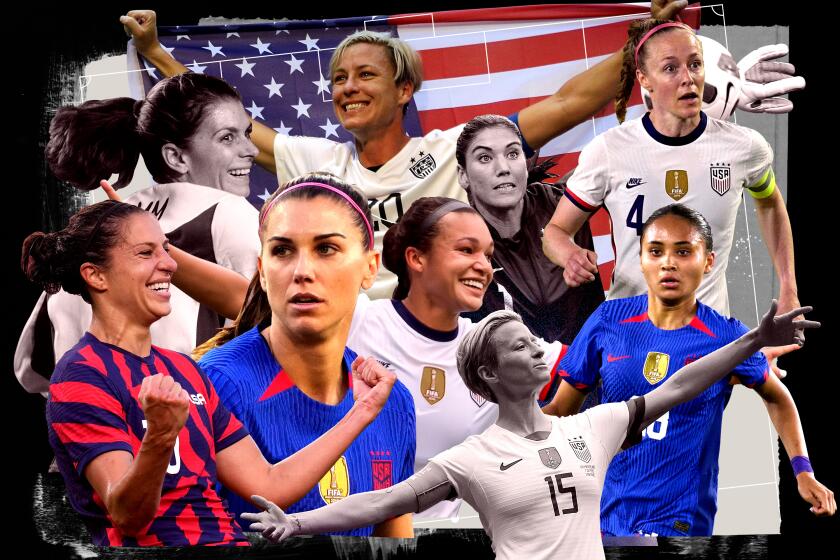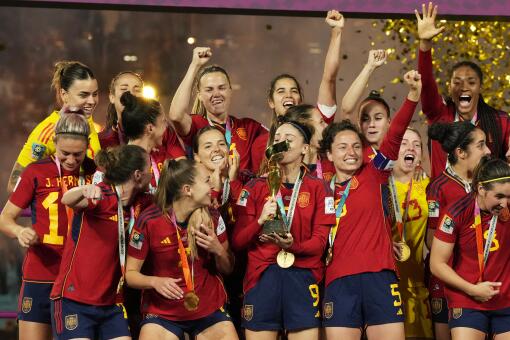Ali Riley cares about the World Cup maybe more than the country she plays for does
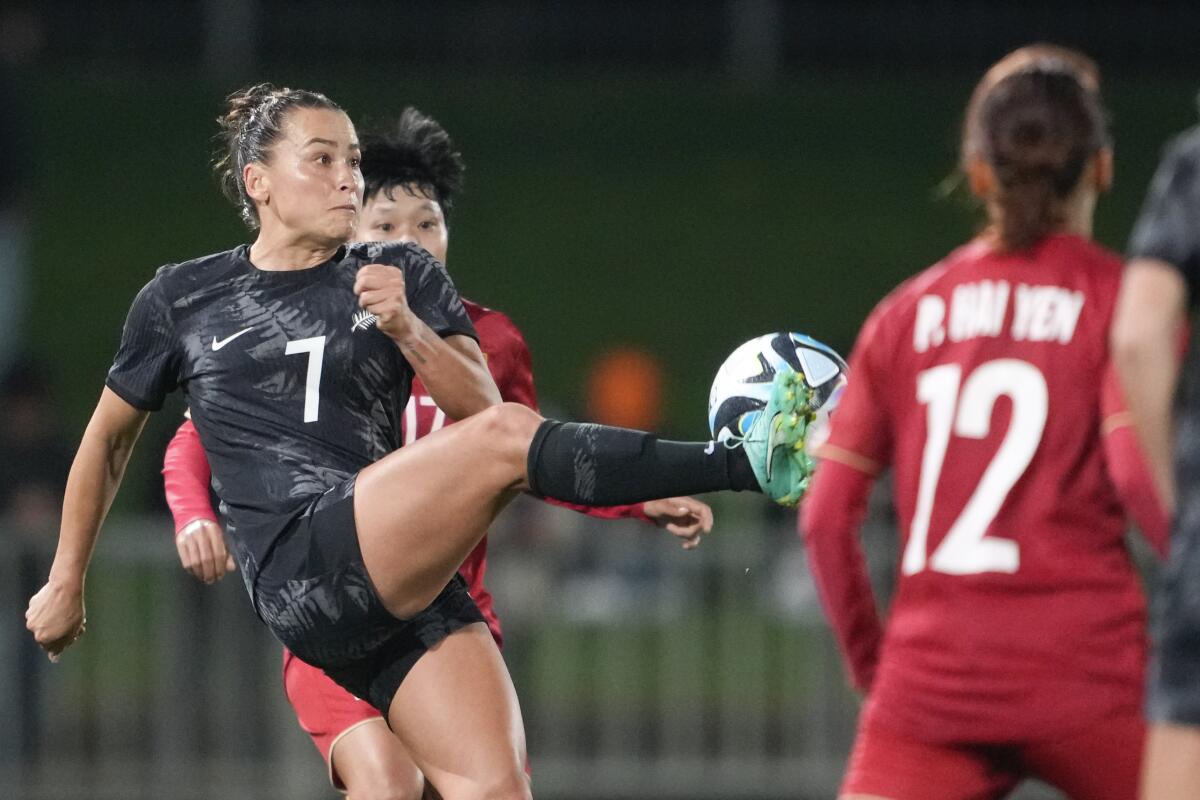
- Share via
AUCKLAND, New Zealand — Ali Riley acknowledges she cries all the time. Watching TV, reading a book, listening to an inspiring story; any and all of those can start the tears flowing.
But she promises she will not — cannot — cry when the national anthems play before Thursday’s opening game of the Women’s World Cup. As captain of New Zealand, which is welcoming the world to its shores for one of the most important sporting events ever held there, she must keep a stiffer upper lip.
Yeah, good luck with that.
“I will cry right now just thinking about that moment,” she said. “There’s the sights and the sounds and the smells and everything. But I can’t, I cannot, I will not cry. I’ll be so focused on the team and just really taking it all in.”
Ahead of the 2023 Women’s World Cup in Australia and New Zealand, we review the USWNT’s all-time greats and its up-and-coming stars.
In this case, the tears would be understandable. The game with Norway will mark the start of Riley’s fifth and likely last World Cup, one New Zealand is staging along with Australia. With two host countries, 32 teams and 64 games, the monthlong tournament will be the largest Women’s World Cup in history. The prize-money purse of $150 million is also the largest for a Women’s World Cup.
How many people in her adopted homeland care is another question, however. There is little energy in the country’s largest city on the eve of the opening kickoff. Rainbow-colored World Cup banners flap from flagpoles along Queen Street, Auckland’s main commercial thoroughfare, but a block to either side the tournament presence ceases to exist.
With the city enveloped by drizzly weather, few people are wandering about in soccer jerseys — at least ones visible under their winter coats — and the destination sign on one Metro bus flashed, “GO ALL BLACKS!!!,” an exhortation for New Zealand’s popular rugby team, which plays Australia later this month.
World Cup tickets sales topped 1 million last month, according to FIFA, leaving the tournament on pace to break the attendance record for a standalone women’s sporting event. But only a quarter of those tickets were for the 29 games to be played in New Zealand, despite the fact the two-time reigning champion U.S. will play all three of its group games here. Last week FIFA made 20,000 tickets to four games in New Zealand available for free to anyone willing to sit in the stands.
Riley, who grew up in Southern California, graduated from Studio City Harvard-Westlake and Stanford, then spent her entire international career playing for her father’s native New Zealand, will be right in the middle of it.
“Everything around this feels like just a culmination of so many important milestones in my life and my career,” she said. “I get very emotional thinking about it.”
Riley’s journey to this moment has been anything but smooth. Growing up in Pacific Palisades, she remembers going to the 1999 Women’s World Cup at the Rose Bowl and dreaming that someday she would play in that tournament. So after leaving Stanford, where she majored in psychology but contemplated seeking a medical degree, she planned to return to Southern California to play alongside Marta with the LA Sol.
But the team folded and the league followed suit shortly after; it would be another 13 years before she would play a professional club game in her hometown.
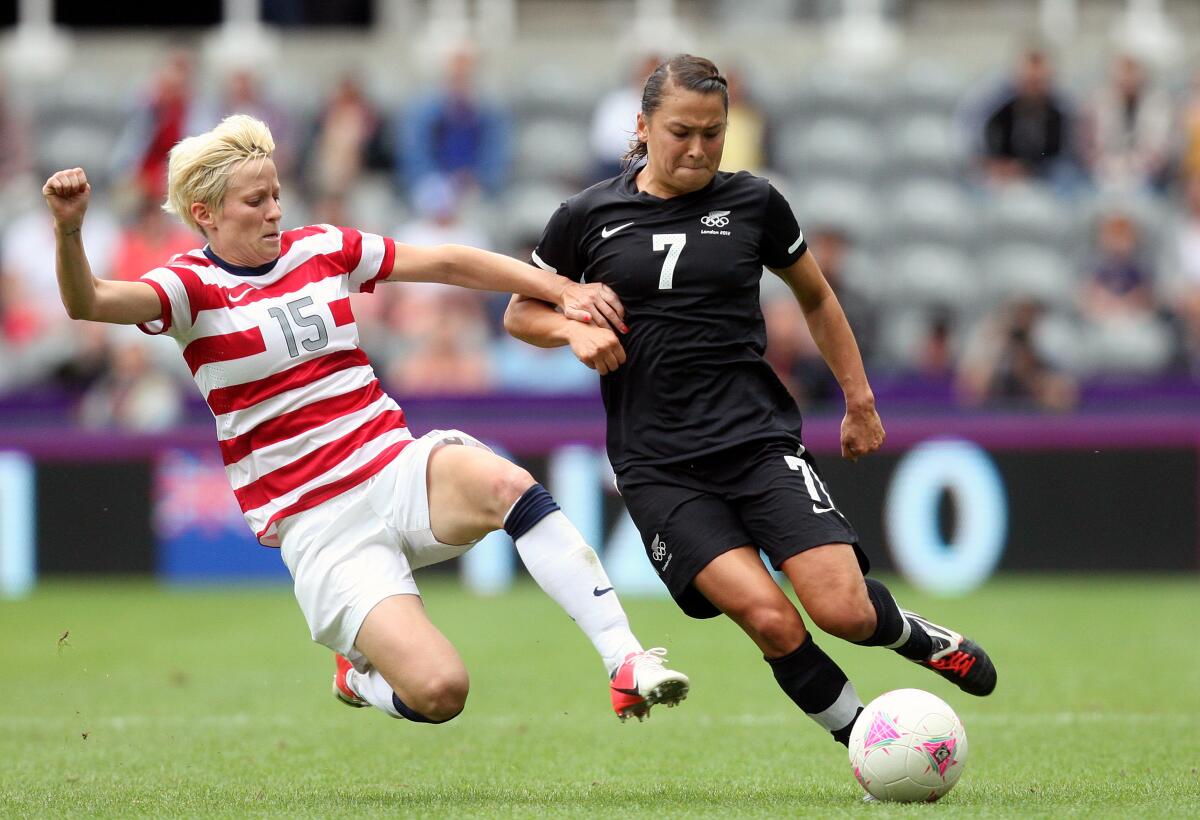
In the interim, she spent six years in Sweden — long enough to obtain Swedish citizenship — and played in Germany and England before signing with the Orlando Pride of the NWSL in 2020, only to have the pandemic shut down the league six weeks later. Two years after that, Angel City FC, a first-year franchise, sent allocation money and a draft pick to Orlando for the rights to Riley, who became the team’s first captain.
The only constant through all that was Riley’s performances with New Zealand. Only one woman, Ria Percival, has played more games for the Football Ferns than Riley’s 152 and only Abby Erceg has worn the armband more often. Riley, one of the most experienced outside backs in international soccer, could pass both of them this year.
She is well aware of the numbers, but that’s not why she plays. Her work with the player council for the global players union opened her eyes to using soccer for social change. So while her approach has been far more subtle than the in-your-face activism of Megan Rapinoe and others, she is no less passionate.
“Having a dad from New Zealand, I’ve had so much opportunity. That’s what I want for everyone,” said Riley, whose default expression, a wide smile, can turn expressive and excitable when the conversation goes in a more serious direction. “And I don’t mean that everyone has the opportunity to play for the national team, but just to play soccer or to play sports or to do whatever they want. That’s why I’m so passionate about young kids of all backgrounds, no matter their skin color, no matter who they love, no matter who their parents are, to have the opportunity to do whatever they want in life.
“I had a head start because I had a dad who gave me a New Zealand passport. Soccer has given me so much and I just want it to be a safe space that women and girls feel like they belong.”
What Riley has never done, though, is win a World Cup game. New Zealand has played every tournament since Riley joined the team as a teenager in 2007, but its best results were a draw with Mexico in 2011 and ties with Canada and China four years later. In their World Cup history, the Kiwis are 0-12-3 and have been outscored 34-8. (The men’s team has done no better, going 0-3-3 in its two World Cups.)
New Zealand, which has won just one of its last 12 games, will open group play with No. 12 Norway and finish against 20th-ranked Switzerland. But in between it gets the lowly Philippines, a World Cup debutante, in the New Zealand capital of Wellington.
“It would be so incredible and it would be so meaningful,” Riley said of winning for the first time. “We’ve been working so hard to get that win. New Zealand’s had a very insane, beautiful, painful journey at World Cups.”
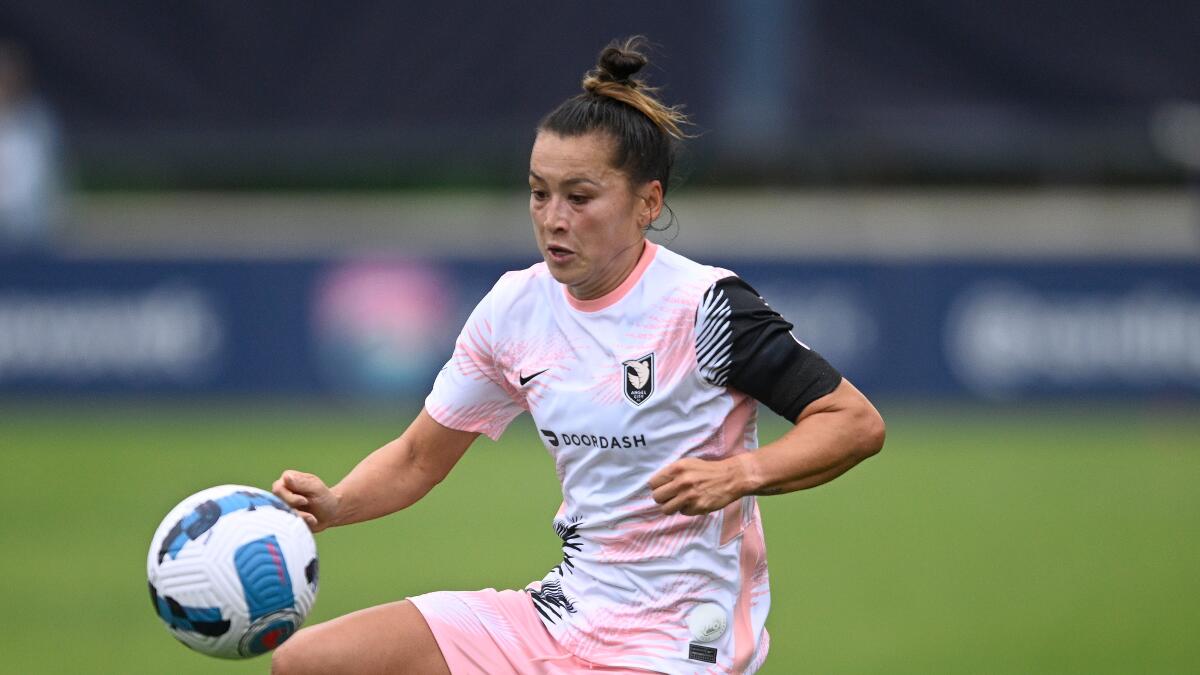
At 35, Riley is far closer to the end of her career than she is to the beginning, although when or where she will finish remains undetermined. Early next year New Zealand faces qualifying for the 2024 Paris Olympics and her contract with Angel City will take her through 2025. If the U.S. and Mexico win the rights to stage the 2027 World Cup, Riley might stick around for a chance to play in that tournament.
But if this proves to be the end of the road internationally, Riley said she can’t think of a better way to go out: playing before the home crowd — such as it is — in her adopted country in the largest, most lucrative and, judging from FIFA’s projections for TV viewership, most-watched Women’s World Cup.
“It’s really special. That’s why I see it more as an opportunity,” she said. “How can we make something great happen? How can we make a lasting impact and a legacy? And for me that goes beyond soccer.
“So for New Zealand, which is a small country that’s pretty far away from everything else, all the young people at these games will really be able to dream big. And it doesn’t have to be that they dream to be soccer players. Just plant a seed that you can do anything you set your mind to.”
That just might be something worth crying about.
More to Read
Go beyond the scoreboard
Get the latest on L.A.'s teams in the daily Sports Report newsletter.
You may occasionally receive promotional content from the Los Angeles Times.

